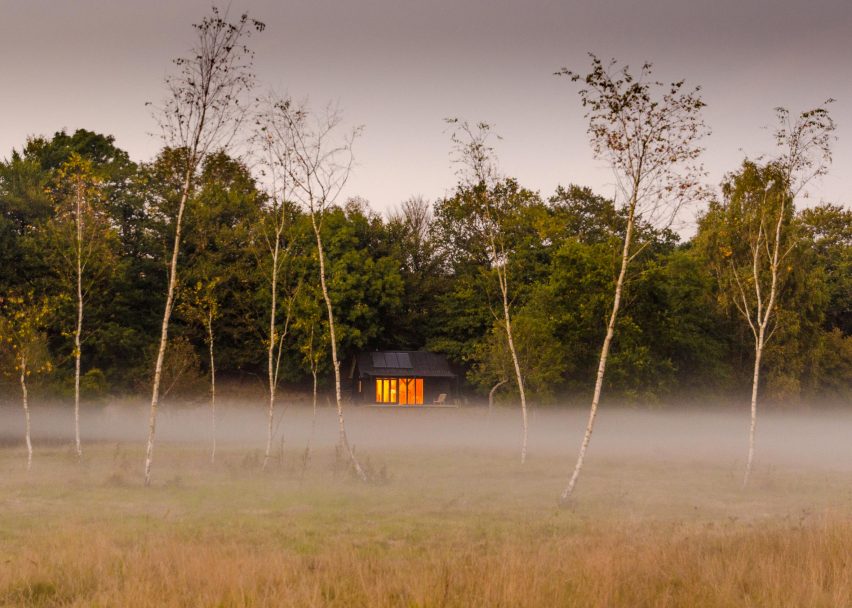British firm Out of the Valley has developed an oak-framed cabin with burnt-cedar cladding that can be installed anywhere to provide a simple place to escape the stresses of modern life.
The Oak Cabin was designed by Out of the Valley founder Rupert McKelvie as a sustainable low-impact dwelling that is equally suited to use in the countryside or at the end of an urban garden.
The cabin combines traditional timber-frame construction methods with modern details including glazed bi-fold doors and steel guttering.
McKelvie trained as a wooden boat builder and worked in the furniture industry before establishing Out of the Valley in 2015 at his farm in the picturesque Dartmoor National Park.
"I have always had an interest in small scale architecture and after I built my first cabin it was clear that there was a demand for my craft," said McKelvie, who designs the buildings and works with a team of craftsmen on their construction.
"A large part of the process is carpentry based," he told Dezeen, "but we also work with metal and stone and draw on skills including timber framing, cabinet making, boat building and engineering."
Wood for the cabins is sourced from sawmills local to the site and prepared by McKelvie and his team to make it ready for construction. The designer is also always on the lookout for storm-fallen trees that can be cut into planks, dried and used later for internal furniture.
The oak cabin has a traditional trussed framework that can be erected in just two days. A layer of wood-fibre insulation is then applied before the structure is wrapped in charred cedar boards.
The burnt wood gives a dark finish that enables the building to blend in with the shadows of a wooded setting. In contrast, the interior features a white-washed ash kitchen, furniture and panelling.
A wood-burning stove introduces heating, with photovoltaic panels on the roof generating electricity to help power lighting and a convection oven. The cabin can be connected to a water supply to provide water to the kitchen and bathroom.
The last few years have seen a rise in the number of innovative cabin designs, with other examples including a woodland retreat for a life coach in Austria and a compact building in Sweden featuring glazed walls sheltered beneath a broad roof.
According to McKelvie, the popularity of these small, simple dwellings reflects the need for escapism felt by many people who lead busy and stressful lives, often predominantly in cities.
"Cabins offer a space that allows their occupants to live more modestly and reconnect with simple pleasures," he explained. "This brings about a greater sense of wellbeing, whether it be in a woodland or city garden."
"Our work is about the wild but you can honour that in any setting," the designer added. "This philosophy is amplified by integrating off-grid principles and technologies."
In addition to the oak-framed cabin, the company also produces a larch-clad office cabin with a vaulted ceiling, and works with clients to develop customised buildings suited to their individual needs. Commissions have included a sauna, yoga studio and summerhouses.
Its most recent project is the design and production of a mobile cabin, which McKelvie claimed "aims to make off-grid dwellings much more accessible."

